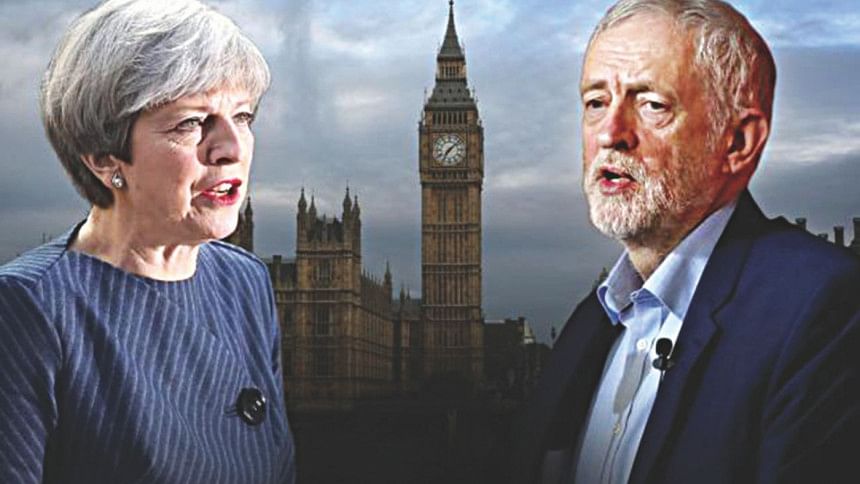Eyes on the British election

Less than a week is left to the snap election in the UK. The latest Gallup poll points to a neck-and-neck contest between the Conservative Prime Minister Theresa May and her opposition Labour Party contender Jeremy Corbyn. Only last week pollsters had predicted a majority of 50 MPs for the incumbent prime minister in a best case scenario and that of two MPs in a worse turn of fortunes for her. A wafer-thin margin of victory by two MPs for May over Corbyn as a probability speaks of how close the race is getting.
About prophesies, let's be mindful of a caveat to their dependability. British people have learnt to question the integrity, accuracy and credibility of survey polls. They keep much less faith in Gallup polls these days following flawed predictions in two test cases: First, on the outcome of Brexit referendum; and secondly on the scale of David Cameron's decisive electoral victory. His win with absolute majority emboldened Cameron in the first place, to go for a referendum to silence the Eurosceptics, setting off chain effects in which Britain is reeling.
Nevertheless, a latest appraisal of the relative merit of their candidacies came through their participation separately in a one-and-a-half-hour-long question-answer session organised jointly by Sky News and Channel Four last Monday night. The leaders first answered questions from the audience and then journalist Jeremy Paxman reputed for his razor-sharp questions.
In terms of performance and positioning on issues, Corbyn seemed to have an edge over Theresa May. Embarrassing questions about Conservative government's failures and the prime minister's frequent changing of mind stalked Theresa May. By contrast, even though Corbyn had a difficult patch facing up to questions on his anti-war and staunch leftist stances, he edged ahead with his alternative proposals for social transformation.
Corbyn made it clear that he would implement Brexit but was against setting targets for a reduction of migration. He appears to be progressive in other ways; on the question of rejecting war policy, Corbyn says western intervention has made countries devoid of government, a context that spikes terrorism which makes it unsafe for everybody.
Going a step further, he said he was for eschewing conflicts in preference to discussions with such controversial groups like Hamas to solve problems with them.
Many in Britain tend to believe that Theresa May personifies a 'hard Brexit' while Jeremy Corbyn represents 'soft Brexit'. May has already warned of 'walking away from negotiations' if the divorce terms are stiff. In contrast, when Corbyn was asked if he conjured up a scenario in which Britain failed to strike an arrangement with the rest of the EU, he said, "There's going to be a deal."
Here is point for deeper reflection. Since the gap is narrowing between the two contenders in opinion polls, it is being dubbed as a fairly open game now. Why did she call the unscheduled election "seeking a strong endorsement of her Brexit strategy?" It begs a question as to whether she will have a strong enough mandate to negotiate with the EU.
Her u-turn in social care for the 'silver brigade' (old people) has made a mockery of the conservative commitment to geriatric care. How many times has May changed her mind on the sensitive issue! The system ran like this: In principle, the state looked after old people. The silver brigade would pay up to 23,250 sterling pounds towards their own social care with the rest to be supplemented by the government.
The Conservative manifesto proposed to raise the ceiling of beneficiary contribution to one hundred thousand sterling pounds. The amount will be realised after the death of the beneficiary by selling the assets of the deceased. To avoid homelessness, it is only after the death of both the spouses that the property will be disposed of. Yet the proposed raising of the ceiling angered the silver brigade. The government retracted, so any positive reform is being held up.
Its withdrawal provoked a joke, rather banter: While after a party gets elected it is known to break a manifesto-related promise, the Conservative government has set an example of reneging on it before being voted to power!
Andrew Neil, Editor of The Sunday Times and a famous TV anchor was even more caustic. Referring to the Tory electoral slogan — Strong and Stable — he delivered this punch- line: "You are Weak and Wobbling!"
The writer is a commentator on current affairs and former Associate Editor, The Daily Star.
E-mail [email protected]

 For all latest news, follow The Daily Star's Google News channel.
For all latest news, follow The Daily Star's Google News channel. 



Comments